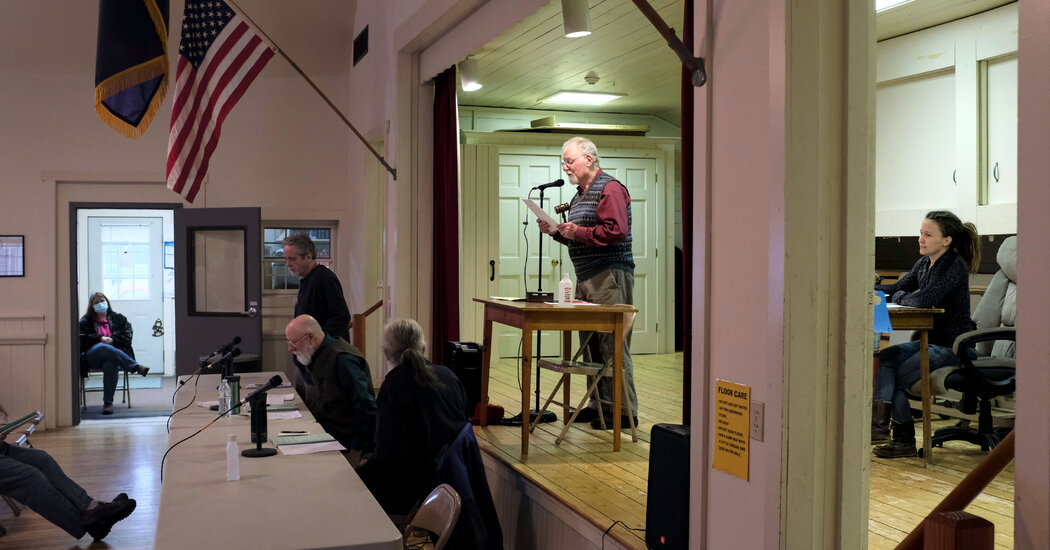
CROYDON, N.H. — The tiny New Hampshire town of Croydon fits the New England of the imagination, with its cozy general store, one-room schoolhouse and local museum open by appointment. The only thing missing is supposed to be missing: a stoplight.
But it’s not just the Rockwellian setting that makes this community of 800 seem quintessentially American. People here have just experienced a fractious come-to-Jefferson moment that has left many with a renewed appreciation for something they had taken for granted: democracy.
“Showing up. That’s the big lesson,” said Chris Prost, 37, a Croydon resident who runs a small brewery from a barn at the back of his house. “And not just showing up, but also knowing what’s going on.”
Hope Damon, 65, a dietitian who is pursuing a new career as a result of her town’s recent crisis, agreed. What happened here, she said, “could happen most anywhere.”
To understand what happened — and is happening — in Croydon, you should remember the New Hampshire motto: “Live Free or Die.” This is, after all, the only state that does not require adults to wear seatbelts.
You also should know that New Hampshire’s individual-rights vibe, along with its small population (1.38 million) and large legislature (400 representatives and 24 senators), has drawn libertarians like colonists to a tea party.
This includes the Free State Project, a movement that for years has promoted a mass migration of “liberty activists” to the state so as to seed a kind of limited-government Shangri-La. The group espouses “radical personal responsibility,” “constitutional federalism” and “peaceful resistance to shine the light on the force that is the state,” its website says.
Croydon, incorporated in 1763, is among the New Hampshire towns with a free-state vein running through its granite hills. This was hinted at in 2020, when Ian Underwood, a town selectman aligned with the Free State, proposed eliminating the police department as a way to fire its sole employee, the longtime and somewhat controversial chief.
The three-member select board adopted the approach and instructed the chief to return his badge and gear. He promptly handed over his uniform, which he happened to be wearing, and then, in hat, boots and underwear, walked out into a February snowstorm. His wife collected him down past the general store.
Croydon life continued, with yard sales at the museum, Halloween celebrations at the fire station and generally low turnouts at the annual town meetings — a direct-democracy tradition common in New England, when residents gather to approve, deny or amend proposed municipal budgets.
On a snowy Saturday this past March, the 2022 meeting began in the two-century-old town hall, where the walls are adorned with an 1876 American flag made by the “women of Croydon” and instructions to reset the furnace to 53 degrees before leaving.
Residents approved the town budget in the morning. Then they turned in the afternoon to the proposed $1.7 million school budget, which covers the colonial-era schoolhouse (kindergarten to fourth grade) and the cost of sending older students to nearby schools of their choice, public or private.
This is when Mr. Underwood, 60, stood up and threw a sucker punch to the body politic.
Calling the proposed budget a “ransom,” he moved to cut it by more than half — to $800,000. He argued that taxes for education had climbed while student achievement had not, and that based in part on the much lower tuition for some local private schools, about $10,000 for each of the town’s 80 or so students was sufficient — though well short of, say, the nearly $18,000 that public schools in nearby Newport charged for pupils from Croydon.
In pamphlets he brought to the meeting, Mr. Underwood asserted that sports, music instruction and other typical school activities were not necessary to participate intelligently in a free government, and that using taxes to pay for them “crosses the boundary between public benefit and private charity.”
The pamphlet did not note that its author was a 1979 graduate of the public high school in Chesterton, Ind., where he starred on the tennis team, ran track, played intramural sports and joined extracurricular activities in math, creative writing, radio and student government. Also: National Honor Society member, National Merit finalist and valedictorian.
One person not completely gobsmacked by Mr. Underwood’s proposal was the school board chairwoman: his wife, Jody Underwood. The Underwoods, who do not have children, moved to Croydon from Pennsylvania in 2007 in part to join the Free State mission; they are now considered a Free State power couple.
Dr. Underwood, 61, a learning scientist with a doctorate in education, said that she had known of her husband’s budget-cut proposal beforehand, but hadn’t felt obliged to give the community a heads-up. “Do Ian and I talk about things? Yes,” she said. “Is that shocking?”
Even so, she said, “I didn’t think it was going to pass.”
In fact, Mr. Underwood’s motion was seconded, sparking a contentious debate that included his wife reading a statement in support of the budget cut — in effect arguing against the $1.7 million budget that she and the rest of the school board had previously recommended. (Dr. Underwood later explained that her husband’s assertions — including that education spending had gone up 30 percent in recent years — had persuaded her.)
Amanda Leslie, 42, a resident who teaches in another district, became so alarmed that she texted her husband to get to town hall right away: “The Free Staters are trying to cut the budget more than in half.”
His vote wouldn’t have mattered. The budget-slashing amendment passed, 20 to 14.
The school clerk, Angi Beaulieu, was so dismayed by what she had just witnessed that instead of signing her account of the minutes with the standard “respectfully submitted,” she wrote, “Regretfully submitted.”
The shocking budget cut meant that the school board suddenly had to craft a new financial plan, while many parents suddenly had to come up with thousands of dollars to keep their children in public schools.
“I would have to put in an extra thousand hours of work a year,” said Ed Spiker, 38, a painting contractor whose two sons attend Newport public schools.
Mr. Underwood did not respond to requests for comment. But in the weeks after the meeting, he and his wife made separate appearances on an online Free State program to discuss what Free Staters were claiming as a victory for their cause.
Mr. Underwood asked what for him appears to be a fundamental question — “Why is that guy paying for that guy’s kids to be educated?” — and denied that he and his wife were “in cahoots.”
“It’s a lot of stress on her at home,” said Mr. Underwood, who has described himself as a former planetary scientist and artificial-intelligence researcher. “Less stress on me. I just threw the wrench into the machinery, and now, you know, the school board has to clean it up.”
Dr. Underwood, meanwhile, smiled as she recalled the amendment’s passage. She also noted that “people were pissed.”
For students taking debate, as Mr. Underwood did in high school, this is an example of understatement. Many Croydon residents were livid.
But they were also chastened. They hadn’t attended the town meeting. They hadn’t fulfilled their democratic obligation. They hadn’t kept informed about the Free State movement. To some observers, they had gotten what they deserved.
“I was practically kicking myself in the ass for not being there,” Mr. Spiker said. “I guess I assumed our town would take care of it.”
The moment revealed a democracy mired in indifference. Turnout at town meetings has been low for years. The town’s websites are barely rudimentary, with school board minutes posted online sporadically. The select board’s minutes are found at the town hall — open three afternoons a week — or the general store, beside chocolate bars being sold to benefit the local humane society.
From this muddle of anger, confusion and regret, though, a movement was born. It came to be known as We Stand Up for Croydon Students.
Conservatives, liberals and those who shun labels — “an entirely nonpartisan group,” said Ms. Damon, one of the members — began meeting online and in living rooms to undo what they considered a devastating mistake. They researched right-to-know laws, sought advice from nonprofits and contacted the state attorney general’s office to see whether they had any legal options.
They did: Under New Hampshire law, citizens could petition for a special meeting where the budget cut could be overturned — if at least half the town’s voters were present and cast ballots.
Ms. Beaulieu, 44, a project manager for a kitchen and bath store, helped to gather enough signatures for the necessary petition. Once a date in May was set for the special meeting, she and other volunteers spread the word, knocking on doors, conducting phone banks and planting lawn signs.
Meanwhile, the three-member school board developed a plan to fit within its shrunken budget. It would mean that more than half the jobs in the town’s tiny school system would be either lost or outsourced.
For the lower grades, a private contractor would provide in-person learning at the schoolhouse that included a certified teacher overseeing three so-called guides, who needn’t be certified. For the higher grades, $9,000 allocated for each student would cover the cost of nearby private schools or an in-person online option — “in a church, or town hall, or some rented space,” Dr. Underwood said — but only about half the tuition for public schools.
Democracy is a scrum, especially in a town of 800. There were awkward encounters at the Shaw’s supermarket in Newport, cross-accusations of bullying and misinformation, sharp words exchanged on Facebook and at town meetings. Some neighbors stopped taking long walks together.
There also developed a heightened awareness — and, for some, a heightened distrust — of the Free State movement.
Aaron McKeon, 39, a school board member whose children were already being taught at home, said that the We Stand Up supporters “didn’t waste any time starting a Free State witch hunt.” In fact, he said, they inaccurately described him as a Free Stater because his positions sometimes aligned with those of the Underwoods — though he believed that Mr. Underwood’s sudden and divisive motion to cut the budget was not the best approach.
“I agree with some of the things they try to do,” Mr. McKeon said of Free Staters. “But that doesn’t make me one of them.”
“I don’t believe it for a second,” said Ms. Leslie, the teacher.
The crisis in Croydon generated a curious democratic dynamic. Since the law required that at least half the town’s electorate participate in the special meeting’s vote for it to be binding, those trying to overturn the Underwood budget encouraged people to attend, while those hoping to retain it encouraged people to do just the opposite and stay home.
On the chilly Saturday morning of May 7, Croydon residents filed into a spacious building at the local YMCA camp for their special meeting. The We Stand Up contingent needed at least 283 voters.
The turnout: 379.
The vote in favor of overturning the Underwood budget: 377.
The vote against: 2.
The We Stand Up crowd cheered and hugged, leaving Mr. Underwood to vent online with posts titled “Your House Is My A.T.M.” and “Possibly Dumbest Thing I’ve Heard Someone Say, Ever,” and Dr. Underwood to frame the moment as both an impressive voter turnout and a victory for “mob rule.”
“It felt to me like a bunch of woke people came to Croydon,” she said.
Croydon’s experience resonated well beyond its borders, receiving substantial regional news coverage. It became a cautionary tale for these times — or, perhaps, a reflection of them.
“As citizens we have many rights, but we also have obligations,” said Wayne Lesperance, a political science professor at New England College, in Henniker, N.H. “And when we don’t fulfill our obligations, we often end up with results we don’t like.”
It seems that many in Croydon have come to feel that obligation.
Ms. Damon, the dietitian, is planning to retire and has begun campaigning for a seat in the state legislature. “I hope enough of us can get together and find a middle ground,” she said.
Ms. Beaulieu, the school clerk and former school board member, is breaking a private vow and plans to run again for a school board seat. “I thought, ‘I don’t have the time,’” she said. “Then I thought, ‘Yes, you do.’”
Ms. Leslie, the teacher, is working on the political campaigns of her We Stand Up colleagues. She said she is fueled by a desire to oust from public office anyone associated with the Free State movement.
Mr. Spiker, the painting contractor, spent a few hundred dollars on a camera and a microphone. Now he records and posts the school board and select board meetings online.
And the group originally known as We Stand Up for Croydon Students is now called We Stand Up for Croydon. Its members met in a living room a couple of weeks ago to discuss future plans, including how to confront that central threat to democracy, complacency.
“Outsiders think they know what happened,” said Mr. Prost, the brewer. “Town rallies to restore the budget! Democracy lives! But most people here know that’s not the whole story. It’s just the beginning.”
Kirsten Noyes contributed research.




